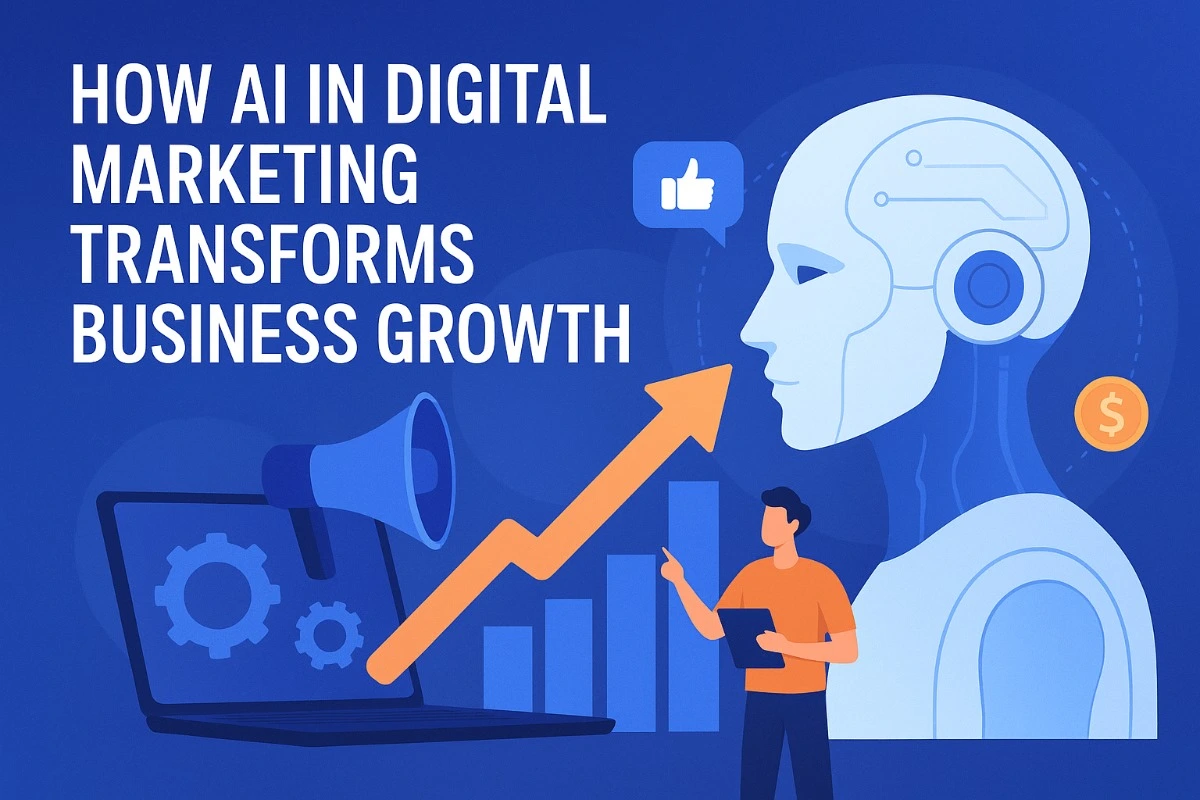Artificial intelligence has emerged as a game-changing force that’s reshaping how businesses connect with their customers. From personalized product recommendations that seem to read our minds to chatbots that provide instant customer support, AI in digital marketing has moved beyond science fiction into everyday business reality.
Smart marketers are discovering that AI doesn’t just automate tasks—it unlocks insights, predicts customer behavior, and creates experiences that drive real results. Companies using AI-powered marketing strategies report up to 37% higher conversion rates and 52% faster lead generation compared to traditional methods.
This comprehensive guide explores how AI is revolutionizing digital marketing and provides actionable strategies to help your business harness this technology effectively.
Understanding AI in Digital Marketing
AI in digital marketing refers to the use of machine learning algorithms, natural language processing, and predictive analytics to enhance marketing efforts. Unlike traditional rule-based systems, AI can learn from data patterns, adapt to changing consumer behaviors, and make intelligent decisions in real-time.
The technology encompasses various applications including customer segmentation, content personalization, automated bidding, sentiment analysis, and predictive modeling. These capabilities enable marketers to deliver more relevant experiences while optimizing their campaigns for better performance.
Key Applications Driving Results
Personalized Customer Experiences
AI analyzes vast amounts of customer data to create highly personalized experiences. E-commerce giants like Amazon use AI to recommend products based on browsing history, purchase patterns, and similar customer profiles. This level of personalization increases customer engagement and drives higher conversion rates.
Marketing automation platforms now use AI to determine the optimal time to send emails, the best subject lines for individual recipients, and the most effective content for each customer segment. This approach transforms generic mass marketing into tailored conversations that resonate with each customer.
Intelligent Content Creation and Optimization
AI-powered content creation tools help marketers generate blog posts, social media content, and ad copy at scale. These platforms analyze successful content patterns and create new material that aligns with brand voice and audience preferences.
Content optimization goes beyond creation. AI analyzes how different content performs across various channels and automatically adjusts headlines, images, and calls-to-action to improve engagement rates.
Predictive Analytics for Better Decision Making
Predictive analytics uses AI to forecast customer behavior, market trends, and campaign performance. Marketers can identify which leads are most likely to convert, predict customer lifetime value, and anticipate churn before it happens.
This foresight enables proactive marketing strategies. Instead of reacting to customer behavior, businesses can anticipate needs and deliver solutions before customers even realize they need them.
Enhanced Customer Service Through Chatbots
AI-powered chatbots provide 24/7 customer support, handle routine inquiries, and guide customers through the sales process. Modern chatbots understand context, maintain conversation flow, and escalate complex issues to human agents when necessary.
These virtual assistants collect valuable customer data during interactions, providing insights into common pain points and frequently asked questions that can inform broader marketing strategies.
Practical Implementation Strategies
Start with Clear Objectives
Before implementing AI in digital marketing, define specific goals. Are you looking to improve lead generation, increase customer retention, or optimize ad spending? Clear objectives help you choose the right AI tools and measure success effectively.
Begin with one area where AI can make an immediate impact, such as email marketing personalization or social media content scheduling. Success in one area builds confidence and provides learning opportunities for broader implementation.
Choose the Right Tools and Platforms
The AI marketing landscape offers numerous solutions, from comprehensive platforms to specialized tools. Consider your budget, technical capabilities, and integration requirements when selecting AI marketing tools.
Popular options include customer relationship management systems with built-in AI, marketing automation platforms, and standalone tools for specific functions like content creation or social media management.
Focus on Data Quality
AI systems are only as good as the data they process. Ensure your customer data is clean, complete, and regularly updated. Implement proper data collection practices and maintain data hygiene to maximize AI effectiveness.
Consider data privacy regulations and obtain proper consent for data usage. Transparent data practices build customer trust and ensure compliance with regulations like GDPR and CCPA.
Monitor and Optimize Continuously
AI systems improve over time as they process more data. Regularly review performance metrics, analyze results, and adjust strategies based on insights. What works today might need refinement tomorrow as customer behaviors and market conditions change.
Set up dashboards to track key performance indicators and establish regular review cycles to ensure your AI marketing efforts stay aligned with business objectives.
Overcoming Common Challenges
Budget Considerations
AI marketing tools vary widely in cost, from free options with basic features to enterprise solutions requiring significant investment. Start with affordable tools that address your most pressing needs, then scale up as you see results and justify additional investment.
Many AI marketing platforms offer flexible pricing models, including pay-per-use options that allow you to control costs while testing effectiveness.
Skills and Training
Successful AI implementation requires team members who understand both marketing principles and AI capabilities. Invest in training your team or consider partnering with experienced AI marketing agencies.
The learning curve exists, but many modern AI tools are designed for marketers rather than data scientists. User-friendly interfaces and extensive documentation make adoption more accessible.
Integration with Existing Systems
AI marketing tools must work seamlessly with your existing marketing stack. Evaluate integration capabilities before making tool selections, and plan for potential workflow adjustments.
Most established AI marketing platforms offer integrations with popular CRM systems, email platforms, and analytics tools to minimize disruption during implementation.
Measuring Success and ROI
Track specific metrics that align with your AI marketing objectives. Common success indicators include increased conversion rates, improved customer lifetime value, reduced customer acquisition costs, and enhanced engagement metrics.
Compare performance before and after AI implementation to quantify impact. Many businesses see improvements within weeks of implementation, with more significant gains developing over months as AI systems learn and optimize.
Document lessons learned and successful strategies to inform future AI marketing initiatives and justify continued investment in these technologies.
The Future of AI-Powered Marketing
AI in digital marketing continues evolving rapidly. Emerging technologies like voice search optimization, augmented reality experiences, and advanced predictive modeling will create new opportunities for customer engagement.
Businesses that start implementing AI marketing strategies today position themselves to take advantage of future developments. The technology will become more sophisticated, but the fundamental principles of using data to create better customer experiences remain constant.
Transform Your Marketing with AI Solutions
AI in digital marketing represents more than just technological advancement—it’s a fundamental shift toward more intelligent, efficient, and effective customer engagement. Businesses that embrace AI marketing strategies gain competitive advantages through better personalization, improved decision-making, and enhanced customer experiences.
Success requires strategic planning, proper implementation, and continuous optimization. Start small, focus on clear objectives, and scale your AI marketing efforts based on results and learning.Ready to harness the power of AI for your marketing efforts? Explore AI Marketing Solutions and discover how intelligent automation can transform your business growth and customer relationships.





